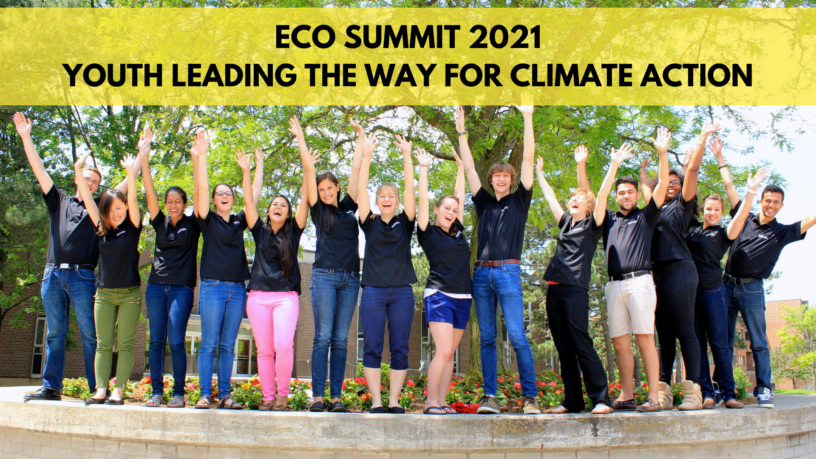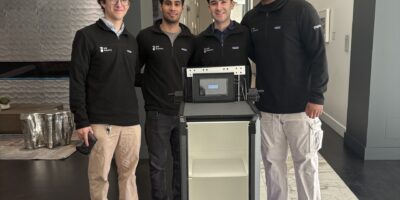By Maria Fraser Semenoff, Sustainability Projects Coordinator at Waterloo’s Sustainability Office
From November 24th to 25th, over 100 staff, students and faculty attended the Sustainability Office’s eighth annual Eco Summit centred around “Youth Leading the Way for Climate Action”. This year’s event had three parts, including a main event, the Youth & Climate Action Panel, and the Youth Changemaker Speed Networking session.
During the main Eco Summit event, Waterloo’s Director of Sustainability, Mat Thijssen, launched the 2021 Sustainability Report. Parking Services highlighted the University’s EV charging stations, the newly launched Bike Cage parking and the TravelWise program. Dr. Bruce Frayne was also thrilled to share information on the new Sustainability and Financial Management degree program that merges sustainability and finance. In addition, certificates were awarded to Green Office and Green Labs for their efforts in making their workspaces sustainable.
The second event was the Youth & Climate Action Panel that featured Michelle Angkasa, Beth Eden, Jordan Lin, and Ilona Dougherty. The panel highlighted the unique experiences and perspectives that are needed to address climate change. This discussion was followed by the Youth Climate Changemaker Speed Networking session. The youth climate changemakers that were invited to network with students included Jenna Phillips, Valentina Castillo Cifuentes, Chúk Odenigbo, Navya Vikraman Nair, Darlene Coyle, Truzaar Dordi, and Sofia Slater.
In particular, the panel discussion brought up many interesting points regarding youth and climate action. The panelists mentioned passion driving youth to act, fear of the world ending, and climate change being an existential threat to humanity. They described common barriers for youth such as the perceived lack of knowledge given their age, self-doubt, the superiority of academics over lived experiences, the sense of youth being incomplete compared to adults, and misrepresentation on social media. Furthermore, required resources to be successful were addressed in terms of representation, funding, education, implementation, finding the root causes of climate change, self-care, intergenerational collaboration, and pushing decision makers to focus on what will make the biggest impact.
Following the Youth & Climate Action Panel discussion, audience members were encouraged to ask questions. Unfortunately, due to time constraints, not all of the questions were addressed. A summary of unanswered questions can be found below along with responses from the panelists.
Please note: Some responses were edited and condensed for clarity.
1. How do I get over the feeling that I’m a bad climate activist – e.g. activities I’m involved in cause emissions? Is there anything like a good climate activist?
Beth Eden: Given the systemic nature of a lot of climate issues, being completely carbon neutral is beyond our control. We can, however, make a difference by changing our consumption, transportation, and dietary practices.
Michelle Angkasa: The contribution of companies to climate change is much greater than individual actions, as just 100 companies created 71% of global carbon emissions. I recommend focusing on what you, as an individual, can change (e.g., adopt a more plant-based diet, take public transportation, reuse items) and share these actions with friends to start a movement. Also, advocate by focusing on important areas and getting others to join. While there is no “right” or good way to be a climate activist, as long as you keep your focus on what’s truly important and try your best to bring others along with you, you’re doing fine.
Jordan Lin: I recommend using the Earth Overshoot Day/Ecological Footprint Calculator to understand your impact. By inputting your habits and answers to lifestyle questions, the calculator will tell you how many planets it takes to support your lifestyle. If you can get it down to one, then I think you’re on the right track in terms of personal action.
Ilona Dougherty: It is important to remember that no one is perfect and we all should do the best we can with the resources we have. As long as you are making thoughtful choices whenever you can and working towards systems change, you are a good climate activist in my books!
2. How can I, as a UW Student get involved with Impact Alliance?
Jordan Lin: Follow @sdgimpactalliance on Instagram and Facebook and @sdgalliance on Twitter and subscribe to our Channel! Visit our website to learn about the latest news and view our calendar of events https://www.impactalliance.ca/. Sign up to be a part of the community via the Google Forms on our Linktree.
3. What makes youth of today different compared to other generations when tackling such monumental issues like climate change?
Beth Eden: Our generation has been given permission by youth activists such as Greta to be outspoken! We are a lot fierier and we have global attention like no other time. We can thank social media for that!
Michelle Angkasa: Youth of today are especially cynical, have easy access to information and are more educated. They also understand what is happening and are experiencing lots of change. Gen Z is a very jaded generation. We live in a time of unprecedented social upheaval, where the only constant seems to be uncertainty. From the rapid pace of change in technology, to witnessing huge populist political movements, to seeing and experiencing the devastating effects of climate change firsthand, Gen Z has to reckon with a lot. The existential threat youth are experiencing as they fight for a future for themselves and generations to come. This can be a strategic opportunity, since the voice of youth can rise above the fray and hold those in power to account.
Jordan Lin: Social media has created a broader audience, global connections, and a collective movement. This provides an opportunity to meet people with common interests. However, social media dangers include the spread of misinformation, falsified science by fossil fuel lobbyists, polarization, and toxic and unproductive discussion. It takes a balance to really strike the right note on advocacy through the internet and social media.
Ilona Dougherty: Youth are wired to lead the climate movement. In our article Generation Z in Canada, we highlighted how Gen Z wants to positively impact the world to a greater extent than previous generations. This is a generation that is facing barriers such as economic challenges and unpredictable careers. Many youth also experience mental health challenges and feel more pressure to succeed. However, Gen Z is more educated than previous generations, they are more accepting of racial and ethical diversity, and they have an easier time communicating and collaborating with a larger geographic audience given access to digital technology. These factors make Gen Z well suited to lead the climate movement.
4. Do you think COVID-19 has impacted youth and climate action momentum? If so, how? Why do you think that is? What can be done?
Beth Eden: It has allowed us to have more digital discourse which has also caused extreme polarization online. I think taking a humanistic, personal approach is the way forward. After all, we are emotional creatures and act out of what we feel. If we can make someone feel something about climate change, we are successful in moving forward the climate agenda.
Michelle Angkasa: There is increased trust and flexibility needed for online meetings but many new opportunities for collaboration between people across Canada and around the world. I’m really glad the climate action space has become more aware of the importance of respecting capacity (to prevent burnout) and to proactively accommodate for individual access needs (e.g. closed captioning or live transcription during meetings). We need to continue to be more creative and inclusive about ways we can call in and engage with people, whether online or in-person.
Jordan Lin: Positive outcomes resulted from the lockdowns as it allowed youth to reflect on their position and purpose in society which mobilized many movements, and it created a worldwide community of climate advocacy practice. I recommend taking the pandemic as a lesson that swift action is required for climate and using the opening of a reset to change private sector, civil society, and government behavior to build a green recovery.





Leave a Reply